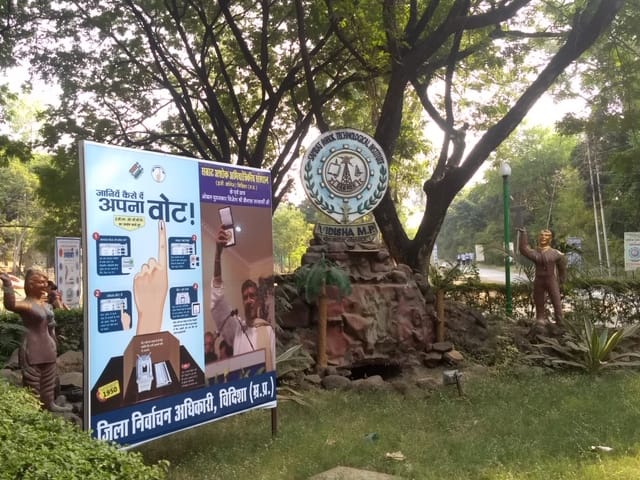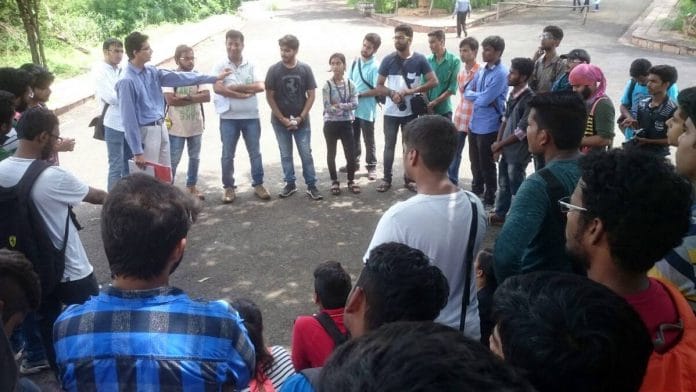This unique approach shows why the assembly election could well be a hyperlocal one than with a state-wide narrative.
Vidisha/Raisen/Bhopal: They may be young. They may be amateur voters. They may be less aware of the state’s political history. But the young voters of Madhya Pradesh, some of whom will be voting for the first time in the assembly polls on 28 November, are clear about their voting priorities and where their political preferences lie.
This young generation — a key electorate — offers a glimpse of which way the electoral winds are blowing in Madhya Pradesh.
While there is a desire for ‘change’, these voters seem to have a refreshing perspective — that the candidate in their constituency is more important to them than any political party, and the merit of their candidate overpowers their wish to see a certain party come to power in the state.
This unique, contradictory approach shows why this assembly election in MP could well be focused on the candidate at the micro level than with an umbrella, state-wide narrative.
The BJP, led by chief minister Shivraj Singh Chouhan, has ruled the state for 15 years now, making this government the only dispensation these young voters have any memory of, the only one they have known.
Voting preference
It is just another day at the Barkatullah Vishwavidyalaya in Bhopal — earlier called the Bhopal University — with students rushing for their classes. As her morning class gets over, 24-year-old Arunima Shukla chats with her friends outside the university library. A BEd student, Shukla will vote for the second time in her life in the coming polls, the first being in the 2014 Lok Sabha elections.
Shukla is clear she likes the BJP government and wants it to continue in power, but she is equally clear that her voting preference is going to be determined by the candidates in her constituency, even if that means not voting for the BJP. She feels the Congress candidate in her area is more deserving, and hence, that will determine her vote.
“I want the same party to continue because I think that is the best party. But in my constituency, I am supporting Congress. I will vote on the basis of candidate,” she says.
Shukla is just one among the many young voters who have this curious, contradictory approach to the elections.
“There is a need for change in thought in the state. Soch badalni chahiye. Hence, a change in government is needed,” says Saavan Kumar, a 21-year-old first-year MSc student, who will vote for the first time.
“But in my area, I want BJP to win since its candidate is better than the Congress one,” Kumar says.
His friend Ayush Upadhyay, also a first-time voter, explains how their voting in this election will be determined not by an overarching state or national issue, but by local issues that are of immediate concern to them.
“Issues are different depending on the area. I come from Hoshangabad and for me, lack of cleanliness and regular sand theft are major issues,” he says.
“I want a fresh face at the state level now. But irrespective of party, I will vote depending on my candidate since eventually they are the ones that impact our lives,” Upadhyay adds.
Rakshanda Patil, a second-year B.Tech student from Morena, studying in the Samrat Ashok Technological Institute, Vidisha — a private institute — will vote for the first time.

Vidisha has been a high-profile district given its Lok Sabha constituency has elected the likes of former Prime Minister Atal Bihari Vajpayee, CM Chouhan and external affairs minister Sushma Swaraj.
“The BJP government has worked a lot in the state, but in my area, the Congress has been the one that has actually been getting some work done,” she says.
“I may like the BJP at the state level but in my constituency, the Congress is a better option,” she maintains.
This conflict between political leaning and voting preference also shows why these elections could perhaps be more closely contested and without a clear wave.
This also shows how hyperlocal issues, anti-incumbency at the constituency level and the work of the candidate could be more critical than the popularity of a party or its face in the state.
However, given the BJP government has been in power for 15 years, some young voters also show their yearning for ‘change’.
Also read: Sadhna Singh Chouhan, the ‘half chief minister’ of Madhya Pradesh
‘We want change’
“Satta parivartan hona chahiye. 15 saal inko dekh liya. Ab kuch naya ho. (There should be a change of regime. We have seen them for 15 years, there should be something new now,” says Rajesh Maheshwari, a 22-year-old student at Bhopal’s Rajiv Gandhi Proudyogiki Mahavidyalaya.
Agress Arvind Meena, is a final-year BA student at the state-funded Swami Vivekanand University in Raisen.
“This will be my first voting experience, I am really excited,” the 19-year-old says.
“I support the Congress party as I feel BJP government hasn’t really done anything. To get things done on the ground, a change in government is needed,” Meena says.
Then, there are voters like Pushpendra Maheshwari, a B.Tech (IT) from Dewas or Akhil Khushwaha of Raisen who say they like the BJP because of its emphasis on the young, its initiatives such as rural housing, Ujjwala and the Ladli scheme and hence, will want to see it being voted back.
Besides local issues, the greatest concern among student voters appears to be the lack of job opportunities in the state. Employment and education, they say, are areas where the state lacks, and they expect the next government to correct this imbalance.
Also read: By demonising RSS in Madhya Pradesh, Congress is only helping BJP
The NaMo factor
However, most of the students are clear on one aspect — their admiration for Prime Minister Narendra Modi, a fact that the BJP hopes will keep it in good stead, at least among young voters in the 2019 Lok Sabha polls.
“In state elections, it is about the local candidate. But in Lok Sabha, I will vote only for Modi, he is the best,” says Upadhyay of Barkatullah University.
At Raisen’s government girls’ college, a classroom full of final-year BA students is reluctant to talk about the elections, and the students say though they will vote, they don’t know much about their candidates or the state’s politics. However, the one thing they seem clear about and willing to declare is their desire to see Modi as PM again.






